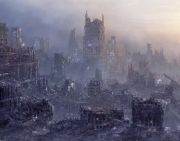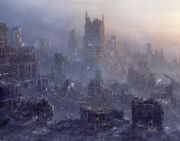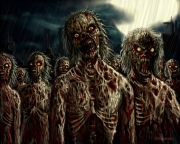1984
Farenheit 451
Brave New World
What do those books have in common? Well, any true readers knows that they are some of the most popular works of fiction in the last century. More specifically, they are some of the best dystopian works penned in the last 100 years. Many of us were introduced to those books in high school, though I doubt we truly understood the underlying meanings hidden in the books. Reading them now is chilling. I know many people that read 1984 and start putting things together. They finish the book convinced Big Brother is staring at their forehead. To tell you the truth, with the debate boiling over the use of drones in the US, who knows where we’ll be in another 50-100 years.

Crazy conspiracies aside, you have to wonder why dystopian books and movies are so popular. There are different types of dystopian fiction. Some of them revolve around some alternate governmental society that is inevitably controlling every aspect of society. When I think about this type, I always think of V for Vendetta. It was an amazing graphic novel and translated perfectly into a movie. Aeon Flux is another example. The Hunger Games is one of the latest of this type of dystopia to make it big, and it introduced the genre to a whole new generation. The recent self-published success story, Wool by Hugh Howey, would translate into a fascinating film or TV series.
Another type is apocalyptic dystopia. Who doesn’t watch the Walking Dead? That’s the ultimate example of this type of dystopia. Revolution is another. There is really no shortage of apocalyptic dystopia fiction out there in both written and film formats. They are certainly not new, but there sure have been a bunch of them lately. It seems like the more our own government gets tangled in a political wasteland, the more apocalyptic fiction pops up.
What does the popularity of dystopian fiction say about us as a people? Well, we love the idea of rebellion and destruction. When we watch an alternate reality government controlling its people, we draw lines to our reality and say, “Look, that’s what is happening to us. If we don’t stop it now, we’ll end up just like them.” Then we love to watch or read about how the people, us, rise up and overthrow their government. We know we can’t do that ourselves, so we do it vicariously through the fictional characters. Sure, it’s not real, but for a little while it sure does make us feel better.
As for zombies and apocalyptic destruction, there is another reason our love affair with those things. This one is simple. Many of us feels like we could survive and that we would be better off. They even have shows of people preparing for any scenario, aptly named Doomsday Preppers. Not only do we think we could survive, but we want to happen. It would be a fresh start, putting everyone on an even playing field (the survivors anyway). With society being so unequal nowadays, it really says something that people would actually want to usher in a doomsday scenario. It is borderline desperation. Let’s face it, once the economy collapsed, many people would have killed to have zombies marching down the street. Heck, if they had our movie and TV skills back in 1929, I can guarantee there would have been some doomsday works of fiction all over the place. If you think about it, one of the factors that drew the US out of the depression was a real apocalyptic scenario called WWII.
Our fascination with dystopia is here to stay. It’s been around for quite a while, and until we create the perfect society (Plato, where are you?), it will always be around. Heck, it really is fun to let your imagination run away with different scenarios of rebellion and mayhem. We create fiction for entertainment, and I just happen to like this type more than many others.


I love all of the books you’ve mentioned. 1984 is probably the most terrifying by far. There is no hope, at all. The concept of thought crimes is truly chilling. At least in most other dystopians the characters aren’t completely brainwashed. *Shudder* I must say I think that Fahrenheit 451 is the most realistic of the three. They all focus on and accentuate one great flaw in society. Fahrenheit and the “screens” is all too familiar. *Double shudder* You know, I think dystopian fiction appeals to so many people because you feel better informed after having read it. Like it couldn’t possibly happen to you now that you know that it could. I guess dystopians help direct us away from our worst natures. Haha I’ve written a dystopian short story and it’s probably the most disturbing thing I’ve written. Also, why isn’t Utopian fiction as popular?